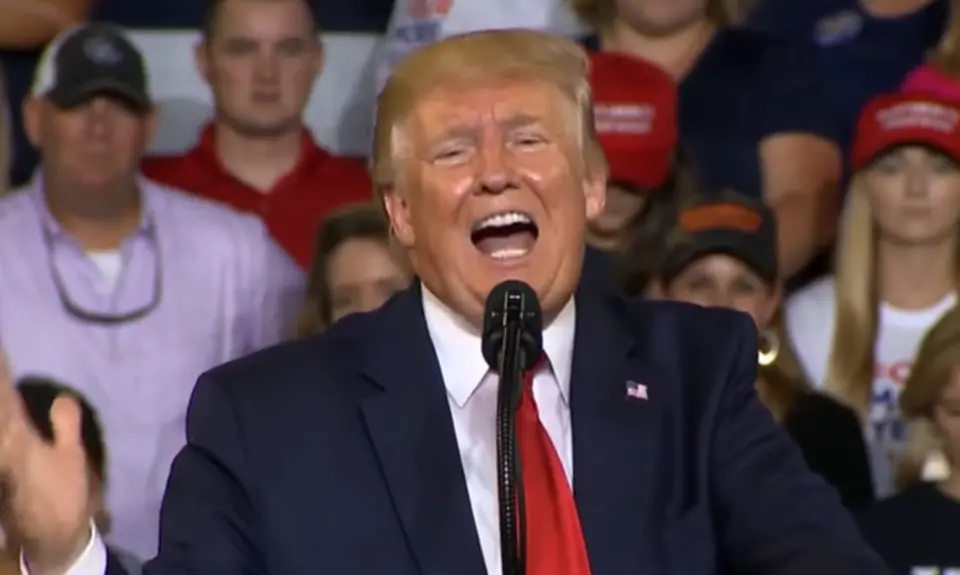In response to allegations of obstruction regarding concerns raised by a whistleblower in a government national security position over a telephone discussion between President Donald Trump and a foreign leader believed to be Volodymyr Zelinskiy, president of Ukraine, the White House today released a declassified account of a phone call in a memo of which the contents, according to a note from the National Security Council, are based on “the notes and recollections of Situation Room Duty Officers and NSC policy staff” who were assigned to listen to the call.
While the specifics of the whistleblower complaint remain unknown to relevant congressional committees and the general public, the complaint is believed to focus on the discussion that took place between the two leaders on that call. News reports asserting that Trump had pressured Zelenskiy to investigate the son of Democratic presidential candidate Joe Biden (who sat on the board of a Ukrainian gas company while Biden served as vice president) spurred House Democrats to launch a formal impeachment inquiry.
Shortly after the memo’s release, the White House blasted out talking points for administration allies, but accidentally included Democrats on the email. BuzzFeed News deputy director of breaking news David Mack received information from a source indicating that the White House then sought to recall the email. Since the email was sent, right-wing political personalities and pro-Trump pundits have predictably fallen in line.
But not all conservatives are completely buying the White House’s spin.
Philip Klein, the executive editor at the Washington Examiner, wrote that the memo of the call between Trump and Zelensky was “very bad news for Trump.” From Washington Examiner:
Reading the full transcript, and understanding the broader context, it's hard to avoid the conclusion that Trump was using the power and influence of the U.S. to advance his own political interests rather than the national security interests of the nation. There was not much talk about what Ukraine could do for America's interests in the region, and a lot more talk about what he could do for Trump personally that would benefit him politically.
[…]
Even if Trump doesn't explicitly say that Ukraine has to investigate Biden, or else...The implication is quite clear in this phone call. The U.S. provides a ton of help, Ukraine wants to purchase weapons, and Trump is asking for a favor in this context. Even if the quid quo pro quo isn't explicit, it's heavily implied.
Seth Mandel, the executive editor of Washington Examiner Magazine, wrote on Twitter that the call memo “Looks pretty bad!” but also noted that impeachment is “a political process, not a legal determination.”
CBS News political correspondent Ed O’Keefe reported that Mitt Romney, a Republican member of the U.S. Senate, said that the memo was “troubling in the extreme, it’s deeply troubling.” Ross Douthat, a conservative columnist for The New York Times, pointed out “it's not really true that there's no quid pro quo; he talks about the quid and then asks for a quo.” Jennifer Rubin, a conservative columnist for The Washington Post, expressed a similar impression: “The new game is that [there’s] no quid pro quo. Factually wrong – read it. Also irrelevant.”
Republican CNN host S.E. Cupp noted: “It’s hard to play the ‘If Obama had done it’ game, because he’d have been impeached by now.” The National Review’s David French said: “This is completely unacceptable.” National Review senior editor Jay Nordlinger tweeted that the memo about the call “is damning as hell.”
Eric Boehm at libertarian media outlet Reason noted the Trump administration’s history of doctoring official records “in order to protect Trump's ego or make him appear less obviously unfit for office.” Boehm writes:
To be clear, there is nothing about the transcript released Wednesday that suggests it has been doctored. Hopefully, it is an honest account of the July 25 call. But the Trump White House has proven, again and again, that it cannot be trusted to accurately reflect reality when the president's interests are at stake.
[…]
An administration that's willing to warp reality to protect the president over small things that can be easily disproved does not deserve any benefit of the doubt when it comes to bigger things. Put another way, if the administration is going to doctor a weather map to protect the president's ego, why would it not go to similar lengths to protect his presidency from an existential threat?





